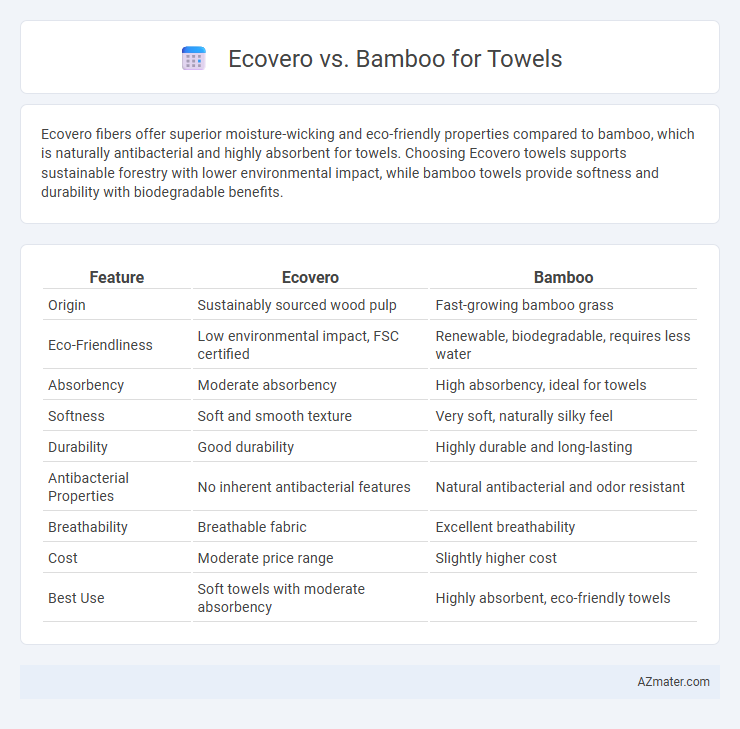Ecovero fibers offer superior moisture-wicking and eco-friendly properties compared to bamboo, which is naturally antibacterial and highly absorbent for towels. Choosing Ecovero towels supports sustainable forestry with lower environmental impact, while bamboo towels provide softness and durability with biodegradable benefits.
Table of Comparison
| Feature | Ecovero | Bamboo |
|---|---|---|
| Origin | Sustainably sourced wood pulp | Fast-growing bamboo grass |
| Eco-Friendliness | Low environmental impact, FSC certified | Renewable, biodegradable, requires less water |
| Absorbency | Moderate absorbency | High absorbency, ideal for towels |
| Softness | Soft and smooth texture | Very soft, naturally silky feel |
| Durability | Good durability | Highly durable and long-lasting |
| Antibacterial Properties | No inherent antibacterial features | Natural antibacterial and odor resistant |
| Breathability | Breathable fabric | Excellent breathability |
| Cost | Moderate price range | Slightly higher cost |
| Best Use | Soft towels with moderate absorbency | Highly absorbent, eco-friendly towels |
Introduction to Ecovero and Bamboo Towels
Ecovero towels are crafted from certified sustainable viscose fibers derived from EU-certified wood sources, offering an eco-friendly alternative to traditional textiles with reduced environmental impact. Bamboo towels, made from the natural fibers of bamboo plants, provide exceptional softness and antimicrobial properties while promoting sustainability through fast-growing, renewable sources. Both materials emphasize eco-conscious production, but Ecovero focuses on responsible wood sourcing and closed-loop manufacturing, whereas bamboo highlights natural fiber benefits and rapid renewability.
Fiber Origins: Ecovero vs Bamboo
Ecovero fibers are derived from sustainably sourced wood pulp, primarily from certified forests in Europe, ensuring a renewable and eco-friendly production process with lower carbon emissions. Bamboo fibers originate from bamboo plants, known for rapid growth and minimal need for pesticides or fertilizers, but conventional bamboo fabric processing often involves chemical-intensive methods like viscose manufacturing, which can impact environmental sustainability. Choosing between Ecovero and bamboo fibers for towels depends on prioritizing certified sustainable forest resources with transparent manufacturing (Ecovero) versus the natural renewability and fast growth of bamboo, balanced against the chemical treatments used in bamboo fiber production.
Environmental Impact Comparison
Ecovero fibers, derived from certified sustainable wood pulp, offer a lower environmental footprint by using 50% less water and emitting 45% fewer greenhouse gases compared to traditional viscose production, making them a greener choice for towels. Bamboo, although naturally fast-growing and renewable, often involves intensive chemical processing and high water usage during fabric production, which can offset its eco-friendly reputation. Choosing towels made from Ecovero promotes reduced deforestation and water conservation, positioning it as a more environmentally responsible option in sustainable textile alternatives.
Softness and Comfort Levels
Ecovero fibers deliver exceptional softness and moisture absorption, enhancing the comfort level of towels with a smooth, luxurious feel ideal for sensitive skin. Bamboo towels are renowned for their natural antibacterial properties and superior softness, often perceived as plush and cozy while maintaining breathability. Both materials offer eco-friendly benefits, but Bamboo typically outperforms in softness due to its fine fiber structure, making it a preferred choice for maximum comfort in towels.
Absorbency and Drying Efficiency
Ecovero fibers and bamboo fibers both offer notable absorbency for towels, but bamboo excels with its natural ability to wick moisture quickly, enhancing drying efficiency. Ecovero, a sustainable viscose derived from wood pulp, provides a soft, breathable fabric but may dry slightly slower than bamboo due to its fiber structure. Bamboo towels are often preferred for superior water absorption and faster drying times, making them ideal for active or humid environments.
Durability and Longevity
Ecovero towels offer notable durability due to their semi-synthetic fibers derived from sustainable wood pulp, providing a soft yet resilient texture that retains quality after multiple washes. Bamboo towels excel in longevity as their natural antimicrobial properties reduce wear from frequent use and maintain absorbency over time, ensuring lasting performance. Both materials contribute to durable and long-lasting towels, with Ecovero emphasizing eco-friendly strength and Bamboo delivering natural fiber endurance.
Skin Sensitivity and Hypoallergenic Properties
Ecovero fibers, derived from sustainably sourced wood pulp, offer exceptional breathability and moisture-wicking properties that reduce irritation for sensitive skin, making them a reliable hypoallergenic choice. Bamboo towels are naturally antimicrobial and soft, which helps minimize allergen presence and soothe delicate skin, but they may vary in processing methods that affect purity. Both materials provide strong hypoallergenic benefits, yet Ecovero's eco-friendly production often results in fewer chemical residues, enhancing its suitability for highly sensitive skin.
Maintenance and Care Requirements
Ecovero towels require gentle machine washing in cold water with mild detergent to maintain their softness and eco-friendly properties, avoiding bleach and high heat drying to prevent fiber damage. Bamboo towels demand a similar gentle washing routine but benefit from air drying or low heat tumble drying to preserve their natural antibacterial qualities and prevent shrinkage. Both materials emphasize delicate care to extend towel longevity, with bamboo towels often noted for requiring slightly more careful drying to maintain their plush feel.
Cost and Accessibility
Ecovero fibers offer a sustainable and cost-effective alternative for towels, typically priced slightly higher than conventional materials but more affordable than bamboo fabrics. Bamboo towels, while celebrated for their natural antibacterial properties and softness, often come with a premium price tag due to processing complexities and limited production scale. Accessibility to Ecovero towels is generally broader, as they are widely available through multiple retailers, whereas bamboo towels may be less common and more region-specific, impacting consumer choice based on location and budget constraints.
Which Towel Material Suits You Best?
Ecovero towels, made from sustainably sourced viscose derived from certified wood pulp, offer a soft texture with excellent moisture absorption and eco-friendly credentials, making them ideal for environmentally conscious users. Bamboo towels provide natural antibacterial properties, high durability, and superior softness, suitable for sensitive skin and those seeking long-lasting, hypoallergenic materials. Choosing between Ecovero and bamboo towels depends on your priority for sustainability certifications, skin sensitivity, and the desired balance of softness and durability in towel materials.

Infographic: Ecovero vs Bamboo for Towel
 azmater.com
azmater.com